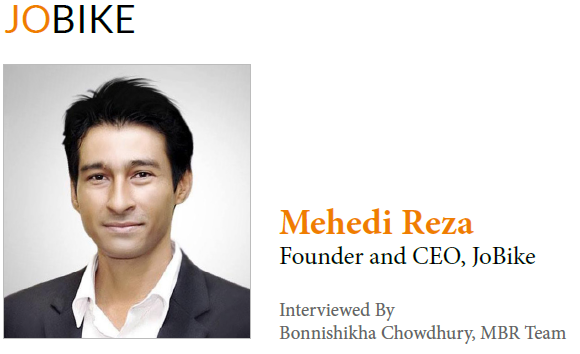
Mehedi Reza, Founder and CEO, JoBike
Bonnishikha Chowdhury, MBR Team
MBR: How did the idea of JoBike come into being?
JoBike: I was in China back in 2017, working for Alibaba. I have seen the rise of bike sharing in China that time. People are using those bikes for short distance travels. Talking about our market- Traffic congestion, pollution, we do not have any short distance mode of transportation that is healthy or safe. On that note, the idea came into my mind to introduce the same service that is used by people around the world. Jobike aims to provide a sustainable solution to the first-and-last mile transportation problem by helping people move around the city or campus in an affordable and convenient way while eliminating their carbon footprint.
MBR: What is the business model and product line of JoBike?
JoBike: Jobike introduced an innovative business model. Users rent bicycles through the mobile app and pay for it. Right now we just have a single model of bicycle which is conventional. Users have to pedal it and have to pay 1 Taka per minute to use the Jobike bicycle.
MBR: How the response was in the initial stage and what strategies have you developed to expand the client base?
JoBike: When we launched our service for the first time at Cox’s Bazar, we had a huge positive response. The idea of being able to unlock a bicycle using a cell phone was completely foreign to them. Not only that, users can leave the bicycle anywhere they want after finishing the ride. We have more than 120000+ users. Jobike’s bike sharing service is an advanced innovation with a valuable economic impact on cities’ sustainable transportation development. Jobike has expanded the scope of public transport services, allowing residents to choose from a wider range of lifestyles and work areas. A recent study shows that 40% of the riders agree that the Jobike has changed their daily life; 48% think the Jobike reduces the time restriction for going out, and 70% think it saves traveling time. Meanwhile, more than half of the riders think the Jobike helps them to save on their traveling budget.

MBR: In an age of technological advancement and increasing internet accessibility, how do you intend to make JoBike a profitable venture?
JoBike: Our vision is to make lives easier through the use of technology. Right now we have conventional bicycle. Going forward we are going to use e-Bike to make it more convenient, where people will have access to any destination any time through the use of technology. We want to cover all divisional cities, tourist areas, universities campuses in order to make Jobike a profitable venture. We will introduce more varieties of products to our users to make their lives easier in terms of mobility.
MBR: How many customers does JoBike have currently? How do you hope to scale up the business?
JoBike: We have more than 120000+ registered users. We have monthly 20000 Active users. We need more and more bicycles to scale the business. Also in the same time we intend to introduce different types of bicycles.
MBR: What challenges does JoBike face in general?
JoBike: We do not have bicycle lanes in our city. The user behaviour or mindset is another challenge. No one ever though people can rent the bicycle, ride it and finally pay for it. Also vandalism was another challenge that we faced at the beginning. We are working towards finding a feasible solution to the problem. One of our visions is to make our city a bicycle friendly city.
MBR: Considering the Covid -19 situation, what are the difficulties have you been facing and how do you intend to recover or mitigate those?
JoBike: Jobike has been operating successfully since the year of 2018 until institutions and universities have been shut down to prevent further transmission of COVD-19. Therefore, Jobike ceased its service to help people stay put and stay safe. Jobike is temporarily shut down in Dhaka University, Chittagong University, Shahjalal University of Science and Technology (SUST). However, we consider Covid 19 as an opportunity. A bicycle allows people to ride in open space without any human contact. Bicycle is a form of public transportation as it poses the lowest risk of COVID-19 transmission. In such circumstances, most of the places around the world have used cycling as an emergency transport solution.
MBR: What are the future plans for JoBike?
JoBike: Our plan is to introduce our services to all major cities and university campuses in Bangladesh. In terms of product offerings, we would like to introduce different modes of bicycle as per users’ needs. We want to make our city a Smart city, a bicycle friendly city.

STEEL & RE-ROLLING INDUSTRY OF BANGLADESH: STRENGTHENING COUNTRY’S INFRASTRUCTURAL DEVELOPMENT
Steel and Re-Rolling industry: fast paced recovery from pandemic on the cards
The Steel and Re-rolling industry, one of the prominent growth drivers of Bangladesh, has had its fair share of hit by the Covid-19 pandemic. This has been reflected on numbers as world crude steel production recorded a 3.2% decline compared to figures recorded in the same time period last year. As a developing nation with increased focus on to infrastructural development and lined up mega projects, Bangladesh sees massive growth potential in the Steel industry. With a market size of around BDT 450 billion the local Steel market employs nearly 1 (one) million people directly or indirectly across the country. The market has been growing at a rate of 15%- 20% for the past 2 years and contributes largely to the country’s GDP. However, the market for steel is turning into a perfectly competitive one from an oligopolistic structure as small players are now gaining efficiency and reaching competitive levels of their larger peers such as AKS, BSRM, KSRM etc. With the growth of the smaller companies, it is safe to say that the challenges that come with surviving in the Steel industry – such as, abundant supply of power and gas, availability of raw materials etc. are being well taken care of.
The Steel industry strategically runs on overcapacity. It is seen that the utilization is around 75% of total capacity which came down to 40% due to the pandemic wave. The prices of raw materials and finished goods are also seen to fall. However, as a resilient nation, Bangladesh is adapting fast to the new challenges that came with the pandemic. And, as we look towards a new normal, companies in the Steel industry must work in collaboration with regulators in order to sustain the growth and maintain the level of efficiency reached prior to the pandemic.
Sushmita Saha
Assistant Manager
IDLC Finance Limited